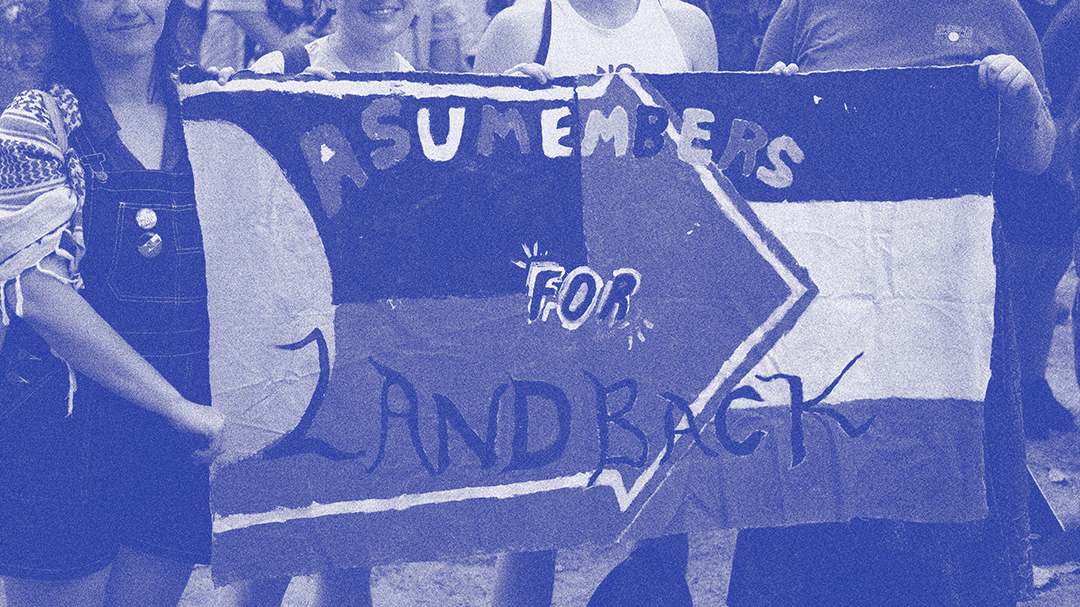Our interview with a rank-and-file unionist building solidarity with Palestine in the ASU

[The following article is drawn from an interview with a rank-and-file member of the Australian Services Union, who is not a member of Black Flag Sydney. The interview was conducted in late February, 2024.]
Question: What is ASU Members for Palestine and how does it relate to the ASU itself? What support has it received from the union and have there been any major wins so far?
ASU Members for Palestine has had varying degrees of success within the union. We have been able to get our secretary Angus McFarland to speak at two Unionists for Palestine speak-outs calling for the anti-protest laws to be scrapped. However, it is still a struggle to get official ASU flags given to us to use at rallies, and we have heard reports that internally we are considered fringe and to be “extremists”.
The ASU seems to be in a tough position between keeping its membership happy, while not alienating its Labor party ties. Our comrades in South Australia were able to push the branch there towards a statement calling for an end to the genocide and for Australia to cut diplomatic and military ties with Israel, we hope to be able to achieve this nationwide.
In other states, it appears that the ASU branches are willing to allocate flags to their membership at Palestine rallies, however it has been a convoluted process in Sydney, with sympathetic organisers within the union doing what they can but ultimately having to protect the political interests of the ASU. As of now, we receive little to no endorsement from the official union.
We are constrained by this lack of support. When it comes to places to meet and organise, the cost of printing and taking action at our own workplaces, support and protection is not a guarantee. The idea that this genocide is not relevant to us as Australian workers has been floating around in different spaces including within the union bureaucracy, so it is hard to be taken seriously in our demands when these ideas are still prevalent.
Why is it important for the union to be visible at rallies and actions supporting Palestine, and why is it crucial for rank-and-file members to be organised and leading these campaigns?
One of the key tenets of unionism is the concept of “touch one, touch all.” Israel’s current onslaught of terror teaches us that you need only to be living in the “wrong place” at the wrong time to live your life under occupation and bombardment. It is important to employ our collective humanity and remind the ruling class and Zionist lobbies that a great deal of Australian workers, those who provide the services society hinges itself upon, are in fact opposed to their contribution to the genocide of the Palestinian people. Trade union activity has historically been a key factor in opposing atrocities and smashing the chains of apartheid societies, as we have seen with the history of apartheid in South Africa.
However, the trade union movement in Australia has been in a state of decline for decades, amid serious attacks from the Howard government, his Liberal Party successors, and from neoliberal Labor governments on either side of the Howard-era. Within the ASU, we are given little to no information as to sector specific meetings, delegate meetings or the membership base. Many of us no longer, or have never, felt a strong union presence at work, and do not feel as though our union is democratically structured. We have been made aware that organisers will be bullied and ostracised for standing on certain tickets that defy Labor affiliation. Organising in rank-and-file fashion reminds us that a union should be its members and that in such hostile territory, paid organisers can never reflect the true desires, needs and power of working-class Australians coming together in collective action.
What kind of tactics or strategies has the group used to build support amongst ASU members, and what are the immediate goals of the group?
ASU Members for Palestine has had a range of successful endeavours. We held a workplace week of action soon after Israel’s assaults began, which involved members taking photographs with keffiyehs, badges, t-shirts and signs whilst at work which were then published on social media. This had a significant effect in boosting the presence of the group and letting members of our union know that there is still room for activism in the workplace. Beyond this, we have workplace mapping initiatives and have attempted to pass motions in our own workplaces. Through conversations with coworkers, we have learned that many people are not aware of their union, what it can do for them, and how unions are relevant to wider socio-political issues. Having a clear presence at rallies has given members an opportunity to approach us organically as well.
In the short term, we have a petition for workers in the not-for-profit (NFP) sector, which calls on NFP organisations to make a clear statement regarding Palestine. It would be a huge success to see community leaders and organisations in the NFP space begin to adopt a pro-Palestine approach, and to add their institutional weight to the campaign in the form of lobbying, information distribution and providing support to affected communities. NFPs for the most part are happy to offer their community spaces to refugees, Indigenous events and orgs, to endorse the Yes vote before last year’s referendum, and to host LGBTQIA+ initiatives; they could be providing a lot of tangible support to the Palestinian liberation movement.
Crucially, we would like to see the ASU fully endorse us, to provide material support to our campaigns, and more importantly to join the fight against apartheid and occupation, as trade unions have historically done. In the long-term, we aim to see a re-democratisation of our union with a strong, organised, rank-and-file membership base at the forefront.
